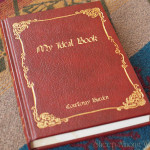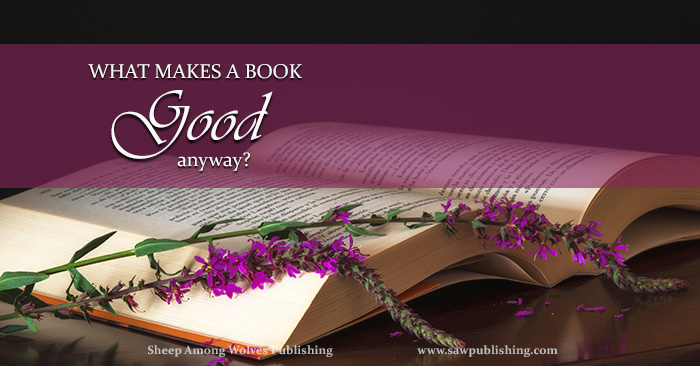What Makes A Book Great, Anyway?
 So what makes a book great, anyway?
So what makes a book great, anyway?
Of course, it’s kind of an obvious question to ask, after we’ve finished answering what makes a book good. But personally, I found this question in some ways the harder of the two in terms of finding an answer which is at once succinct and comprehensive.
After all, how do you define exactly what a great book is?
At Sheep Among Wolves, our aim is to bring people in contact with books that are both good and great. In our last post we defined good as meaning books which are “wise unto that which is good, and simple concerning evil.” (Romans 16:19) Unfortunately, there isn’t quite such an easy way to define the word great.
There are many different characteristics which contribute to literary greatness, and today we will consider a few that we are primarily thinking of at SAW when we say that a book is great.
Quality of English
The first principle of a great book is the quality of its English. Without question, this is a broad category, but a book with a high quality of English would likely display:
- a broad (though not necessarily complicated) vocabulary,
- accurate use of grammar and conventions,
- skillfully, as well as correctly, composed sentences,
- in technical or historical works, a use of English that is suitable to the specific context.
With the exception of the rules of grammar, these attributes are more or less qualitative. No book can pass a test and be marked perfect in all areas. But the greater the book, the more it will measure up to this standard.
Dynamic Character Portrayal
 The next key area in defining literary greatness, is the portrayal of characters. Unquestionably, it requires talent to draw vivid, original, living characters that almost seem to step out of the pages of the book, and become our friends. This ability has a profound impact on making a great book, since characters who engage our interest and become real to us, have an incredible way of bringing a story to life.
The next key area in defining literary greatness, is the portrayal of characters. Unquestionably, it requires talent to draw vivid, original, living characters that almost seem to step out of the pages of the book, and become our friends. This ability has a profound impact on making a great book, since characters who engage our interest and become real to us, have an incredible way of bringing a story to life.
In the writing industry, a character who grows and changes over the course of a book, is termed a dynamic character. When a skilful author writes a character like this who patterns traits and actions which we can emulate, it can have a powerful effect on the reader’s life and faith. This is one place where good and great blur closely together, since the influence of a profoundly-drawn, dynamic Christian character can be classed under its moral impact as much as under its literary one.
Obviously, the area of character development can be assessed only in books which revolve around characters rather than theme, since technical or theoretical works cannot be expected to portray dynamic characters, or any characters at all!
Skillful Control of Plot and Literary Techniques
When we usually think of plot, we imagine breathtaking adventures and cliff-hanging chapter breaks. While these characteristics may be used to create a plot, the simplest definition of plot is merely the chain of incidents by which an author secures the reader’s interest from the start to the finish of the book.
As with all literary techniques, some of the most masterful examples of plot occur when the reader is not even aware that they are going on. The reader is conscious of the effect, not the cause. They don’t know that they can’t put the book down—they just know that they won’t!
There are numerous other literary techniques which, like plot, aid the author in producing the effect they are aiming at in a given passage. The use of description, of changes in speed and mood, of devices for giving or withholding details, all contribute to the perfection with which a great book reads.
The very greatest books can be enjoyed over and over again, because each page is a masterpiece of literary technique.
So What Makes A Book Great, Anyway?
As you can see, a one-line definition of greatness can hardly summarize all that we mean to include in the word great. If we were pressed for an answer, we might say that a great book is one which displays a high level of skill in the use of language, development and literary techniques. But naturally, it’s a definition which probably could use a little expanding.
Either way, the idea of a “great book,” is something that we do well to study and understand. Because—just as it is imperative for the Christian to seek books that are good, so too there is much value in seeking ones that are great.
In many, many cases, the greatness of a book will give its goodness more power.
So, whether we can define greatness in a single sentence or not, let’s make the effort to seek out great books—that are also good books—and allow ourselves the positive influence of greatness and goodness on our minds and hearts.
For a companion discussion of what SAW Publishing means by “good books,” see below:
You might also enjoy:

Does the ideal book really exist? What would it be like if it did? This series of posts takes a more detailed look at some of the tangible attributes which make a book good and great.

Are you looking for a Christian high school poetry course, that combines a high standard of literature with a strong commitment to Christ-centred content? Our FREE 10 Weeks to Writing Good and Great Poetry is the place to start!

Have you ever asked a friend where she keeps her dust cloths? Most of us don’t spend much time talking about something that boring, but this Timeless Tip suggests maybe we’ve been viewing dusting the wrong way!

